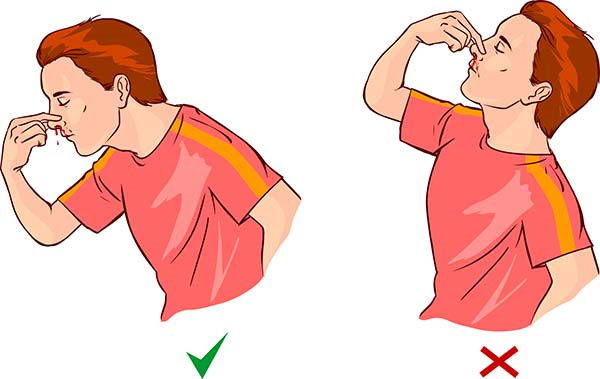Nosebleed, also called epistaxis, is a very common problem that affects adults and children and can occur in different situations. So let's see 10 useful tips to better deal with it, knowing exactly what to do and what not to do.
Don't store avocado like this: it's dangerousIl nosebleeds, also called epistaxis, it is a very common problem that affects adults and children and that can occur in different situations. Let's see then 10 useful tips to face it better knowing exactly what to do and what not to do.
Index
CAUSES OF EPISTASSIS
Le causes for which nosebleeds can come out can be of different kinds: trauma of the nasal septum, weakness of the capillaries following a sneeze or a very severe cold, excessive exposure to the sun, dryness of the mucous membranes or, in the case of children,habit of picking your nose.
Only in rare cases, when the problem occurs frequently, it can be a sign of an ongoing pathology such as hypertension. In this case, always talk to your doctor.
Read also: ARTERIAL HYPERTENSION: SYMPTOMS, REMEDIES AND DIET
The way in which to treat the blood coming out of the nose is the same in all cases but it is always important to identify it first the cause that triggered the epistaxis, among the most frequent are:
• Trauma of the nasal septum
• Cold
• Very strong sternutes and coughs
• Dryness of the mucous membranes
• Allergic rhinitis
• Fragility of the capillaries
• Excessive sun exposure
• In the case of children, the habit of picking their noses
HOW TO INTERVENE
Let's see now 10 tips for adults and children in case of a nosebleed.
1) Sit straight
In the event of a nosebleed, first of all it is good to sit down and avoid the lying position which could be harmful as, instead of letting the blood flow out, it would cause it to congest in the throat.
2) Lean forward to let the blood flow
Instinctively to try to hold back the blood one would have to pull back the head, in reality you have to do exactly the opposite, that is to lean forward to let the blood flow while keeping the mouth open to prevent it from depositing in the throat.
3) Apply cold cloth or ice pack
If you want to try to stop the bleeding first, you can try applying a cold cloth or an ice pack to the nasal septum for a few minutes.
4) Dab the nostril lightly
If blood comes out of only one nostril, you can lightly dab it with your fingers several times for about 10 minutes. In this way, blood clotting is stimulated.
5) Do not insert cotton or gauze to dab
It is best to avoid inserting cotton or gauze to plug the bleeding, especially if you do not have sterile items available or if you have not properly washed your nose first. Better to let a doctor do the right medication if necessary.
6) Calm the babies by trying not to make them cry
It's easy for babies to have a fit of crying when they see blood leaking. However, it is important to try to calm them down as crying could lead to a greater amount of blood in the throat and create unwanted effects such as episodes of vomiting.
7) Wait for the blood to stop flowing
If you follow the previous steps, in most cases the blood stops flowing within a few minutes. Better then to remain relaxed and calm even if, you know, the sight of blood in someone could give particular agitation and create worries.
8) Don't rub or blow your nose
Once the bleeding is over, avoid rubbing or blowing your nose to ensure that the part does not get irritated again.
9) If the blood doesn't stop go to the emergency room
If the blood continues to come out for more than 15 minutes, it is advisable to go to the emergency room to check the situation and take the necessary precautions.
10) Herbal medicine against epistaxis
If the nosebleed comes out frequently enough due to a fragility of the capillaries, it is possible to consider, in the case of adults, to use some medicinal plants able to strengthen the capillary walls. These include gotu kola, horse chestnut, butcher's broom and blueberry. Ask your trusted herbalist for advice.

To recap in case of nosebleeds:
• Don't put your head back
• Do not lie down but stay seated
• Position your head forward
• Squeeze the affected nostril lightly for 10 minutes
• Calm the crying of babies
• Do not insert gauze or cotton if the nasal cavity is not well cleaned
• Apply cold cloth or ice pack
• Calmly wait for the blood to stop flowing
• If the blood does not stop within 15 minutes, go to the emergency room
• Some herbs that strengthen the capillaries are: gotu kola, horse chestnut, butcher's broom and blueberry


























